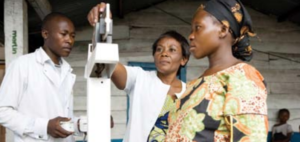Through HINARI, research and teaching at the University of Lubumbashi has flourished
Since gaining access to Research4Life’s HINARI programme, research and teaching at the University of Lubumbashi has flourished

The University of Lubumbashi’s School of Public Health is one of the most productive health research institutes in the Democratic Republic of the Congo. The last few years have seen a steady stream of research that has contributed to the country’s progress in public health.
The school’s recent work includes a study on population exposure to metals that helped convince political leaders to strengthen environmental monitoring, and a study on the determinants of malnutrition, which has revealed the need for water in each city home to reduce malnutrition and control outbreaks of infectious diseases such as cholera. The school “mapped” Lubumbashi’s health to provide a national reference point. And research on HIV infection in pregnant women is helping husbands participate in managing the disease.
According to Abdon Mukalay, general practitioner and the school’s academic secretary, much of this would have been impossible without HINARI. When the school was established in 2003, it did not subscribe to a single international journal. Students and staff had access to extremely limited and often out-of-date references, and their work suffered accordingly. In fact, the best way to access the information required to perform research and publish papers was to seek scholarships or work abroad. But the expense, and the problems of obtaining visas, meant that route was open to a select few.
« The overall quality of written work – from papers, books and doctoral theses to lecture notes and undergraduate assignments – has improved. »
In 2006, Dr Mukalay successfully applied to register the School of Public Heath with Research4Life. All staff members and postgraduate students were given access, and HINARI training is compulsory for students and teachers.
Now able to freely obtain current literature, staff no longer need to leave the country to perform and publish research to international standards. Consequently, they are making fewer trips abroad and are publishing more papers. And, with travel costs falling, more money can be directed to local needs such as laboratory expenses, staff salaries and operating costs.
“Through HINARI,” says Dr Mukalay, shortly to complete a PhD on child malnutrition in Lubumbashi, “the scientific work in the school is escalating, and is being performed faster. I am certain that the quality of teaching and research, and the level of community support, will continue to increase.”
This story is part of the Making a Difference case study collection. Read more stories from Research4Life users.





